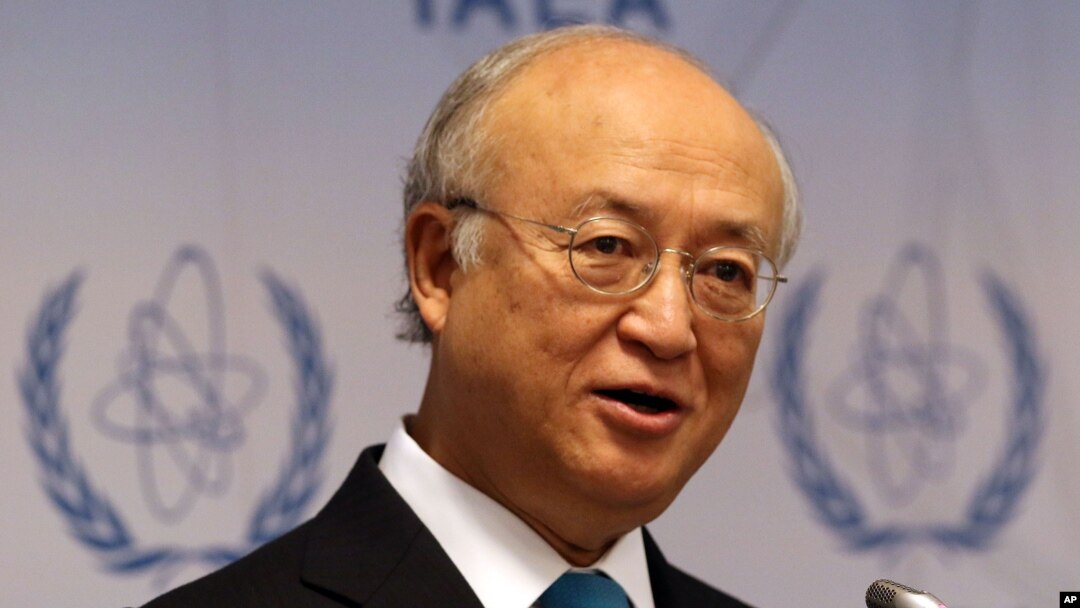Iranian Foreign Minister Mohammad Javad Zarif says his government has invited Yukiya Amano, head of the International Atomic Energy Agency, to Tehran to work with Iranian officials on “how to proceed,” as Iran nuclear negotiators continue talks in Vienna.
Zarif commented on Wednesday as he led an Iranian delegation that held another round of discussions with a U.S. team headed by Secretary of State John Kerry.
Earlier in the day, the U.N. nuclear watchdog agency announced Amano was traveling to Iran to meet with President Hassan Rouhani and other high-level officials on Thursday.
In a statement, the IAEA said the talks were expected to focus on addressing “ongoing cooperation” between the nuclear watchdog and Iran and how to “accelerate the resolution of all outstanding issues related to Iran’s nuclear program.”
The IAEA also said that would include “clarification of possible military dimensions” in Iran’s nuclear program.
In recent week, Iranian leaders have publicly declared that inspectors would not be allowed to access military sites or interview scientists.
WATCH: Pam Dockins reports from Vienna, Austria
Your browser doesn’t support HTML5
VOA's Pam Dockins on Kerry, Zarif Meetings at Iran Nuclear Talks
‘Progress’ is focal point of extension
Word of Amano’s trip comes a day after Iran nuclear negotiators announced they were extending their deadline for an agreement to July 7.
Asked about the extension, Zarif said, "We did not set any deadline. We will continue and we will make progress. We have made progress and we will make progress and we will use every opportunity to make progress."
Later, Kerry, when asked about the new deadline said,“We have our own sense of deadline.
“We are working very, very hard and we have some very difficult issues but we believe we are making progress and we are going to continue to work because of that,” he added.
Iran and the five permanent members of the U.N. Security Council and Germany, the so-called P 5 + 1, are trying to come up with a plan that would restrict Iran's ability to make nuclear weapons while providing the country with sanctions relief.
A nuclear deal would follow “the Lausanne framework fairly closely," said analyst Richard Nephew of the Center on Global Energy Policy. He referred to the framework agreement that Iran nuclear negotiators reached in Switzerland in early April.
A deal would involve reductions in the "installed and operating centrifuges; it will involve a reduction of the amount of enriched uranium in the country, which will have a positive impact on breakout and it will involve a modification of the Arak reactor basically closing the path to the plutonium weapon," he said.
US, Iranian officials comment on talks
Both U.S. President Barack Obama and Iranian President Rouhani commented on the nuclear talks.
Obama said Tuesday the United States would "walk away" from a possible nuclear deal with Iran if he is not convinced it would block Tehran's path to building a nuclear weapon.
Rouhani said Iran would resume suspended atomic activity if Western powers break promises made in an agreement.
The U.S. State Department on Tuesday - the original deadline for an agreement - said negotiators decided to extend until July 7 measures under the interim agreement to "allow more time" for talks on Iran's nuclear program to reach a long-term solution.
WATCH: Heather Murdock reports from Vienna, Austria
Your browser doesn’t support HTML5
Nuclear Talks Personal for Iranian Journalists


